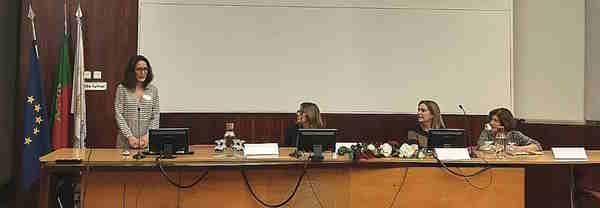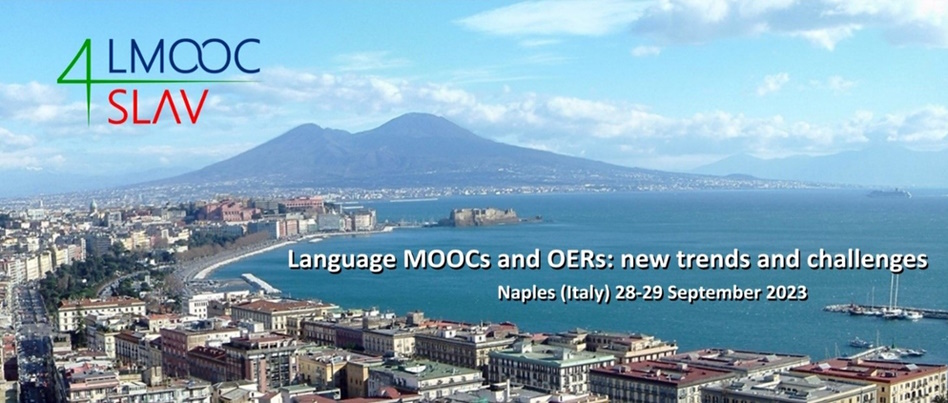ProjectNewsletterIssue#2 – February 2023
Editorial
Welcome to the second newsletter in three languages (IT, PT, EN) devoted to the project "Romance Languages for Slavic-Speaking University Students”, (LMOOC4Slav) funded by the Erasmus+ Programme of the European Union, Action KA2 Strategic partnership for higher education.
We wish to keep a wider audience up–to-date with the results, materials and developments in language teaching and to tell them more about the LMOOC4Slav project thus hoping to encourage the exchange of ideas and experiences as well as a productive collaboration.
You can read this newsletter also on www.lmooc4slav.eu or www.fenice-eu.org/.
The LMOOC4Slav Project
The LMOOC4Slav project offers Slavic L1 students a freely accessible online learning path taking into account their specific needs to face university studies in Italy or Portugal. It therefore provides the creation of MOOCs of Italian and Portuguese academics and open teaching resources. The purpose of these MOOCs is to facilitate the immersion of Slavonic-speaking students in mobility (Erasmus and others) in the Italian or Portuguese university system. The language of academic communication has its own characteristics and requires particular skills and abilities. Academic Italian and Portuguese MOOCs will enable the development of such linguistic and intercultural skills and abilities, as well as strategies that will make students better aware of how to learn new languages and how to learn effectively in the academic context (e.g. how to write expositive and argumentative texts, how to transcode images or graphics, how to take notes, how to take an oral exam).
Each MOOC has 6 modules, consisting of short videos and various activities. The videos feature testimonies from students, administrative staff and teachers. They illustrate some academic specificities. Participants will be asked to make short oral and written productions, some of which will be evaluated by other participants in the MOOC (peer review). The results of the various activities and the end of module quizzes will be used to issue a certificate of passing. The videos, with captions, can also be used by Italian/Portuguese teachers as resources for the classroom or distance learning courses. The terms of use will be provided later on the project website www.lmooc4slav.eu.
The two MOOCs, accessible to those who have reached at least the B1 level of the CEFR in Italian/ Portuguese, will begin the testing phase on February 20 and in the coming months corrections will be made based on the feedback received by the students. Courses will start on July 3, 2023, to register (free of charge): https://learn.eduopen.org/
In addition to the two MOOCs, open teaching resources are being developed for Italian and Portuguese teachers such as LS and interested students, which will be downloadable from the project portal (https:/www.lmooc4slav.eu). The resources will include video recordings with transcripts, written texts on academic topics related to different disciplinary fields and "ready-to-use" learning units.
First international conference & Call for papers in Porto

On 7-8 October 2022, the University of Porto (PT), partner of the project, organized and hosted the first international conference on "Language MOOCS and OERS: new trends and challenges". The programme (https://www.lmooc4slav.eu/programme.php?location=porto) included the presentation of the LMOOC4Slav project and 32 research and pedagogical projects related to the conference theme. The Conference attracted delegates from twelve countries (CH, CZ, DE, ES, IT, MA, MK, PL, PT, RS, RS, USA). Many speakers and participants are leading experts in the area of Language MOOCs (LMOOC).
The conference was one of the first events specifically dedicated to the scientific analysis of linguistic MOOCs. The topics covered by the speakers ranged from current trends in LMOOC, with particular attention to innovative pedagogical approaches and the motivation and performance of students, the development and assessment of language skills, synergies between LMOOC and Open Educational Resources (OER) and other forms of open educational practices.
Second International Conference & Call for Papers in Naples

Abstract submission deadline: June 17, 2023
Call for proposals including research articles, case study presentations and projects within the following guidelines: Language MOOCs, including language learning and teaching with MOOCs; OER/OEP for language learning and teaching; MOOC and student mobility; and initiatives and developments related to these areas supported by European and national programmes.
Contributors are invited for a 20-minute presentation or poster. The submitted contributions will be selected through a double-blind review based on their originality, technical quality and correspondence. Conference presentations and posters can be in Italian, English or Portuguese. The conference will take place in Naples at the Congress Centre of the University L'Orientale, in via Chiatamone, 61. For more information on the call for proposals, the conference team, the submission guidelines, the contribution template and the conference venue, please visi https://www.lmooc4slav.eu/conferences.php.
The authors of an abstract must enter the title of the proposal and the name, affiliation, country and e-mail of each author in the form on the site and send it. They will receive an email with the contribution ID. The proposal, containing the ID received and written following the template on the site, must be sent in PDF and anonymous as an attachment to an e-mail with the subject "LMOOC4Slav Abstract Submission" conference@lmooc4slav.eu
Interested parties will be contacted by 15 July 2023. The works selected by the Scientific Committee will be considered for publication in the Proceedings of the Conferences LMOOC4Slav, to be published at the Perugia Foreigners University Press (https://www.unistrapg.it/node/463) in an open access volume equipped with an ISBN. The volume is valid as a scientific publication for all authors.
LMOOC4Slav in Europa
-
LMOOC4Slav in a Training Course in Switzerland
At the invitation and organization of the Teaching Portuguese Abroad Coordination in Switzerland, Professor Isabel Margarida Duarte, from the University of Porto, conducted a course on “Teaching Portuguese as a Pluricentric Heritage Language” for Portuguese teachers in Geneva, Bern, and Zurich in June 2022, in which she presented the LMOOC4SLAV project.
-
LMOOC4Slav at the EDULEARN22 Conference in Palma de Mallorca (ES)
On 4/07/2022 during the XIV International Conference on "Education and New Learning Technologies", Professor Fatima Silva, from the University of Porto, gave the talk on "The LMOOC4SLAV project: academic discourse for academic mobility", also co-authored by Margarida Duarte, Ângela Carvalho, and Borbala Samu.
-
LMOOC4Slav at the LSPHE 2022 conference at the University of York (UK)
On 9/09/2022 during the international conference on “Languages for Specific Purposes in Higher Education” dr. Agnieszka Pakula of the University for Foreigners of Perugia, presented a report on "Designing an LMOOC for Teaching Academic Italian to Foreigners”.
-
LMOOC4Slav at the University of the Algarve (PT)
On 18/11/2022, prof. Iva Svobodová of Masaryk University presented the project and the Open Educational Resources of Portuguese created within the project and addressed to university students of Slavic language in a report entitled "Romance languages for Slavic university students".
We are looking forward to meeting you online very soon!
Partnership

|